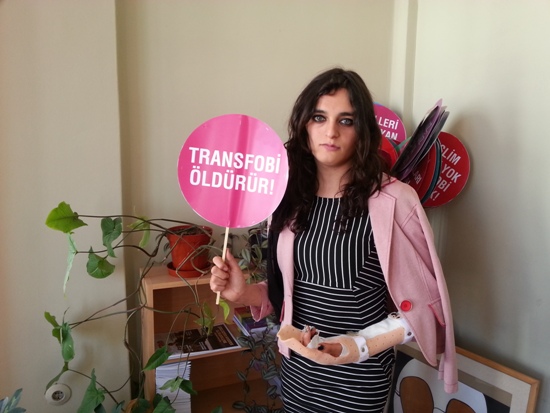[Turkey’s] Constitutional Court decided against the repeal of the law concerning “unnatural sexual behavior.” Homosexuality is still seen as a perversion.
Source: Diken, “Anayasa Mahkemesi, eşcinsel ilişki görüntülerini ‘sapkınlık’ olarak onadı” (“The Constitutional Court affirms [lesbian] sexual relation visuals as ‘perversion’”), 18 April 2015, http://www.diken.com.tr/anayasa-mahkemesi-escinsel-iliski-goruntulerini-sapkinlik-olarak-onadi/
In Aydın, a defendant, who was charged with and filed an objection against the Article 226 [1] of the Turkish Penal Code, which equates visuals of homosexual sexual relations with visuals of rape, sadomasochism, sexual relations with animals, and sexual relations with corpses. The Criminal Court judge, who agreed with the objection against the use of the term “unnatural way” in the article, forwarded the case to the Constitutional Court for the article’s cancellation.
According to the news report by Sözcü, the Constitutional Court denied the request with a majority vote. The Court opinion stated that the punishments prescribed by the article in question refers not to personal circumstances but to the distribution of pornographic images that display different “sexual preferences”[2].
Two associate justices, Serruh Kaleli and Serdar Özgüldür, wrote their dissent to the opinion, stating that “Such relations are within the framework of personal freedoms. ECtHR [European Court of Human Rights] decisions too follow this perspective.”
Kalel and Özgüldür emphasized that, excluding incest, circumstances, which both do not involve violence and are consensual, are protected by the notion of personal privacy and constitute an issue of freedom. The justices commented that “In this respect, the [penal code] article that is subject to the request for dismissal is clearly in violation of the principle of the constitutional state.”
Article 226 of The Turkish Penal Code[1] states:
“The person who produces, imports, distributes, sells, transports, stores, shows, or possesses products that include textual, audio, or visual products that incorporate violent sexual behaviors or sexual behaviors that involve animals, corpses, or unnatural ways, are punished with one to four years of prison and up to five thousand days (approximately 100,000TL [$37,400]) of judicial fine.”
[1] The full text of the article in question, which outlines punishments for the possession and distribution of “obscene” products, is provided below. The Turkish Penal Code does not provide a definition of “obscenity.” -Trans.
“Türk Ceza Kanunu [Kabul Tarihi: 26.9.2004]” (“The Turkish Penal Code [as of 26 September 2004]”), Grand National Assembly of Turkey, http://www.tbmm.gov.tr/kanunlar/k5237.html
Obscenity
ARTICLE 226. – (1) The person
a) who gives, or shows, reads, makes read, or makes listen to a child the content of products that include obscene images, texts, or audio,
b) who shows in public, or displays in places where children may access or see, or displays, reads, makes read, speaks, or makes speak in a visible manner the content of these,
c) who distributes these products for sale or rental in a way that allows one to become acquainted with their content,
d) who distributes for sale, sells, or rents these products in other shopping places than where they have been assigned to,
e) who gives or distributes these products free of charge as part of or as gift along with other products or services,
f) who advertises these products,
are punished by two to six years of prison and judicial fine.
(2) The person who publishes or mediate the publication of obscene images, texts, or audio through the media is punished by 6 months to three years of prison and up to five thousand days of judicial fine.
(3) The person who uses children in the production of products that include obscene images, texts, or audio is punished by five to ten years of prison and up to five thousand days of judicial fine. The person who imports, reproduce, distribute for sale, sells, transports, stores, exports, possess, or provides for others’ use is punished by two to five years of prison and up to five thousand days of judicial fine.
(4) The person who produces, imports, distributes, sells, transports, stores, shows, or possesses products that include textual, audio, or visuals that incorporate violent sexual behaviors or sexual behaviors that involve animals, corpses, or unnatural ways, are punished with one to four years of prison and up to five thousand days of judicial fine.
(5) The person who publishes or mediates the publications in the media and who enables for children to see, listen to, or read the content of the products outlined in paragraphs three and four [above] is punished with six to ten years of prison and up to five thousand days of judicial fine.
(6) Specific security measures are to be taken against legal persons [e.g. corporations, in contrast to “real persons,” e.g. individuals] due to these offenses.
(7) The provisions of this article cannot be exercised against scientific works and, with the exception of the third paragraph and with the condition that children’s access to them is prevented, to works with artistic and literary value.
[2] It is common in Turkey for heterosexist authors / speakers to express their beliefs through the intentional use of “cinsel tercih” (“sexual preference”) instead of “cinsel yönelim” (“sexual orientation”).
Share this:
-
Click to print (Opens in new window)
-
Click to email this to a friend (Opens in new window)
-
Click to share on Facebook (Opens in new window)
-
Click to share on Pinterest (Opens in new window)
-
Click to share on Tumblr (Opens in new window)
-
Click to share on Reddit (Opens in new window)
-
Click to share on Pocket (Opens in new window)
-
Like this:
Like Loading...




